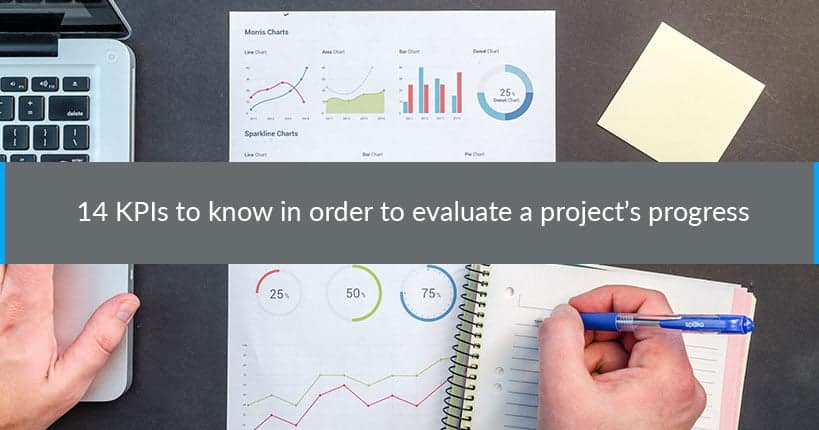Whenever you manage a project, you should always keep an eye on the delays, the budget, the extent of the project and the quality of the work being done. Therefore, in order to know where you are in terms of project completion, it is essential to use KPIs (Key Performance Indicators).
You could compare taking control of a project to driving a car; you need the dashboard with all its dials to get to your destination with minimal stress:
- the rev-counter indicates when you to shift up a gear
- the speed dial shows you how fast you are moving
- the petrol gauge tells you if you have enough petrol to reach your destination
- the other dials also assure you that the vehicle is functioning correctly
These gauges on the dashboard allow you to know whether you will arrive at your destination with no mishaps. It is the same when leading a project using KPIs.
What you should know about KPIs
As is implied in the name, a performance indicator helps you to evaluate the performance of your project. It allows you to know where you are with regards to completing your objectives, in what areas you are progressing well and where you are having problems.
KPIs facilitate the management of projects because they give you a quick overview of the project’s position. In effect, each KPI supplies you with precise information that allows you to evaluate a situation at any time and to make informed decisions.
To use KPIs effectively, remember that the indicators:
- must be linked to a precise objective
- must be realistic, measurable and have a time frame
- influence decision making (even if the decision is not to act(
- must not be redundant
- must be simple enough that everyone can understand
Choose you own indicators with your team and the people (clients, suppliers, etc.) involved from the very beginning of the project.
There are 4 categories of KPIs:
- Cost indicators that allow you to control your project and not surpass the allocated budget
- Deadline indicators are indispensible for allowing you to verify that your project respects its deadlines and doesn’t undergo any delays
- Quality indicators help you to ensure the quality of work done
- Efficiency and progression indicators allow you to know if you are managing the project efficiently; if the budget, resources and time are being used wisely, and if the progression of the project is satisfactory.
14 KPIs to measure the progress of your project
Here are 14 KPIs, classed by category to help you better manage your projects.
Cost indicators
- Real cost: calculate the actual cost of the project. It is measured by adding all of the current expenses of the project.
- Unplanned costs: the total of all expenses paid that were not initially anticipated for the project.
- Delay costs: this KPI allows you to know the costs associated with delays. It is calculated by totalling all additional expenses related to delays such as overtime hours, maintenance, repairs etc.
- Deviation of project cost: calculate the difference between the real cost of the project and the initial estimate cost. Calculation: [Real cost – provisional cost] / provisional cost
Deadline indicators
- Rate of delay: this KPI tells you the percentage of delays as a percentage, by comparing delayed projects to initial planning estimates. Calculation: (uncompleted tasks / anticipated completed tasks) x 100%
- Task duration: a useful tool for measuring the time necessary to complete a task, notably re-occurring tasks.
- Deviation in duration: measure is a task or a milestone takes longer to complete than initially anticipated.
- Deviation of delay: the indicator measures if you are ahead of schedule, on-time or behind schedule on your project compared to your planning. Calculation: Estimated time taken – real time taken.
A negative result indicates that you still need time to finish a project.
Quality indicators
- Client satisfaction: satisfaction surveys are an excellent indicator of quality, as well as client or customer loyalty.
- Number of mistakes: this KPI tells you the number of times where you had to redo a task or rework an element of a task. Mistakes have an impact on the budget and the schedule of your project.
- Client complaints: similarly to customer satisfaction, this is a good indicator of your work/projects’ quality.
Efficiency and progression indicators
- Rate of progression: as the name implies, this KPI shows you how your project is advancing. Calculation: (task accomplished / predicted tasks completed) x 100%
- Number of tasks or milestones achieved: this is another good indicator of project progression.
- Time spent on the project: at any time during the project, compare the work hours that have already been spent working on the project to the number of hours initially planned. This will tell you if your team is productive. If the number of hours already spend is greater than the planned number of hours, maybe you should revise the estimation of time taken to complete the project.
Conclusion
This list of performance indicators is not exhaustive. There are many others and you could even create your own KPIs.
Finally, simplify your life by using project management software. You and your team can directly create and update your KPIs in real time, have a precise vision of the project’s progression and evaluate you team’s performance, as well as the project’s performance.










